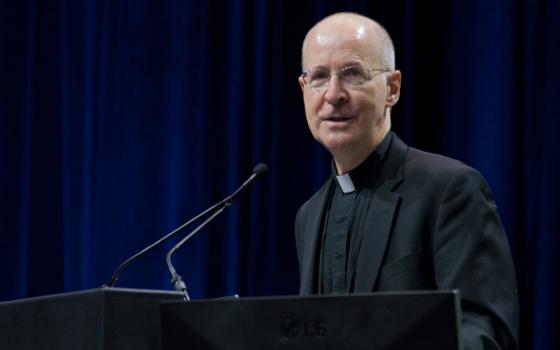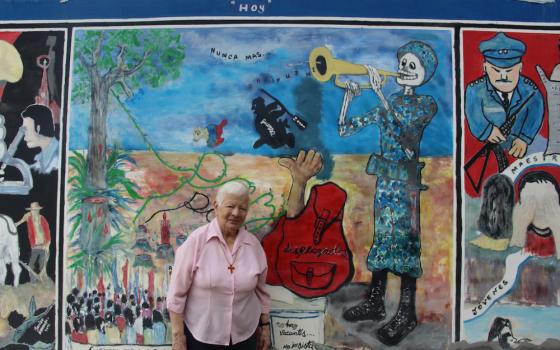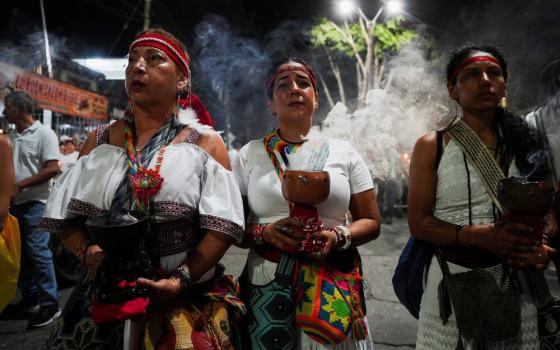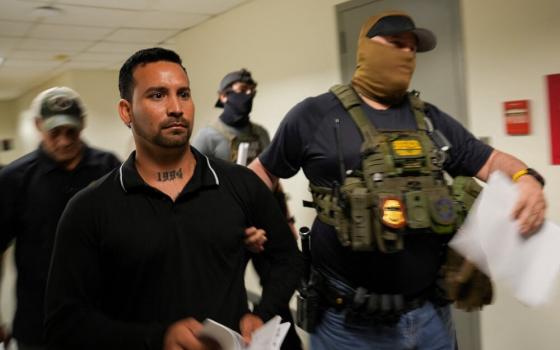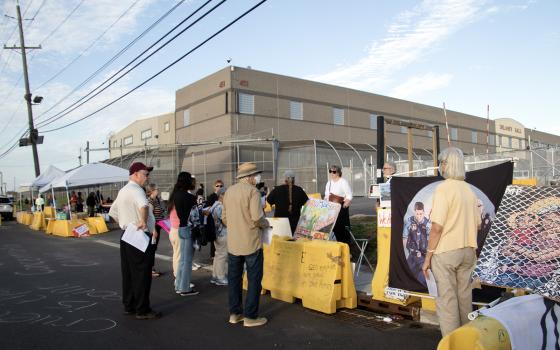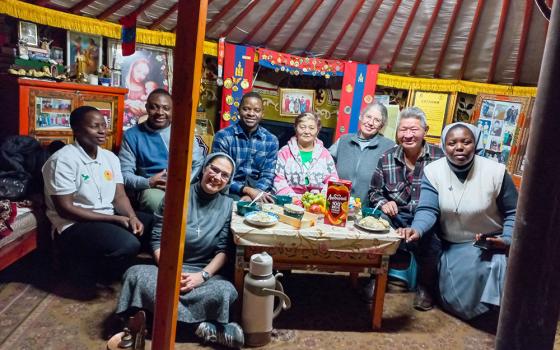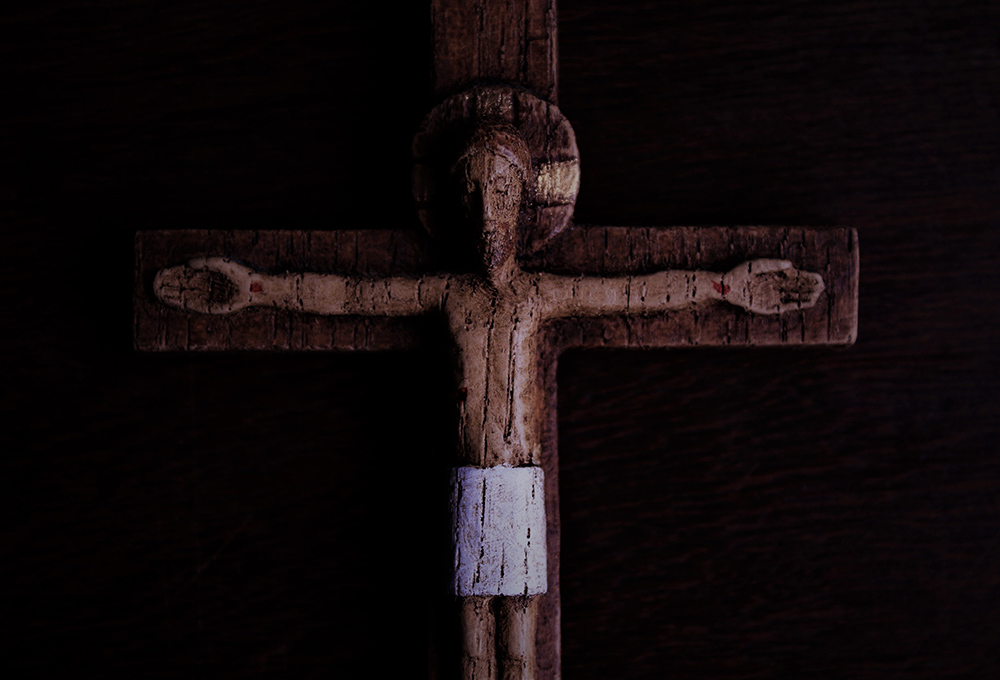
Each time we choose to stand beside the cross of Jesus, we say yes to him. This yes may mean leaving behind our comfort zone of being with our loved ones, of having a good job, or living in a home where everybody understands us. (Unsplash/Rui Silva, SJ)

(GSR logo/Toni-Ann Ortiz)
The panelists this month represent a global group: Australia, India, Ireland, Mexico, the United States and Germany. Most of them have experience in the formation of young people or in religious formation. That made them good choices to comment on the question for this month:
Most formation programs emphasize developing oneself and one's self-confidence. How do we then incorporate Jesus' words, "If anyone wishes to come after me, let him deny himself, and take up his cross daily, and follow me. For whoever wishes to save his life shall lose it, but whoever loses his life for my sake, he is the one who will save it" (Luke 9:23-24)?
______
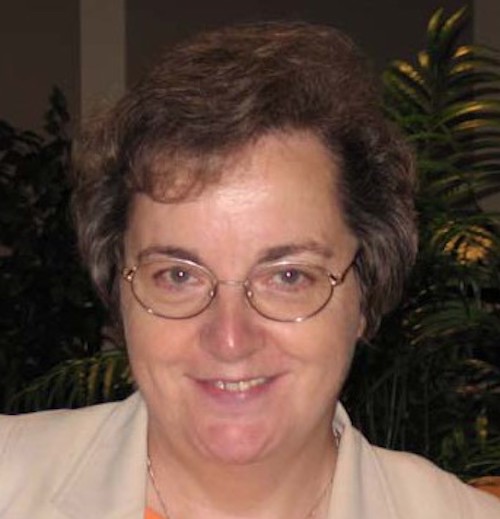 Deirdre Mullan is a Sister of Mercy from Ireland. At the height of unrest in Northern Ireland, Mullan spent 25 years as a teacher and administrator in schools. With a doctoral degree in the feminization of poverty, she has long been active in promoting the education of girls. She served as the executive director of Mercy Global Concern at the United Nations for more than 10 years, later directing the Partnership for Global Justice, a network of more than 125 small congregations at the U.N. Her present ministry is with UNICEF, the United Nations Children's Fund, seeking ways to partner with religious communities.
Deirdre Mullan is a Sister of Mercy from Ireland. At the height of unrest in Northern Ireland, Mullan spent 25 years as a teacher and administrator in schools. With a doctoral degree in the feminization of poverty, she has long been active in promoting the education of girls. She served as the executive director of Mercy Global Concern at the United Nations for more than 10 years, later directing the Partnership for Global Justice, a network of more than 125 small congregations at the U.N. Her present ministry is with UNICEF, the United Nations Children's Fund, seeking ways to partner with religious communities.
The Lucan text attributed to Jesus quoted in the question is part of a greater whole. Chapter 9 of the Gospel of Luke focuses the missioning of all followers — whether in the first century or now. It is the great teaching chapter on what it means to follow the great interrupter, Jesus, who intends to turn the world upside-down with a vision that sets the downtrodden free.
It is also the chapter wherein the disciples glimpse the glory of Jesus in the Transfiguration. The chapter as a whole and the verse in particular is a reminder of what can happen when we forget the focus and become self-serving. The invitation is clear: Keep the vision of the kingdom of God to the fore, and then we can manifest the glory of God that is within each of us.
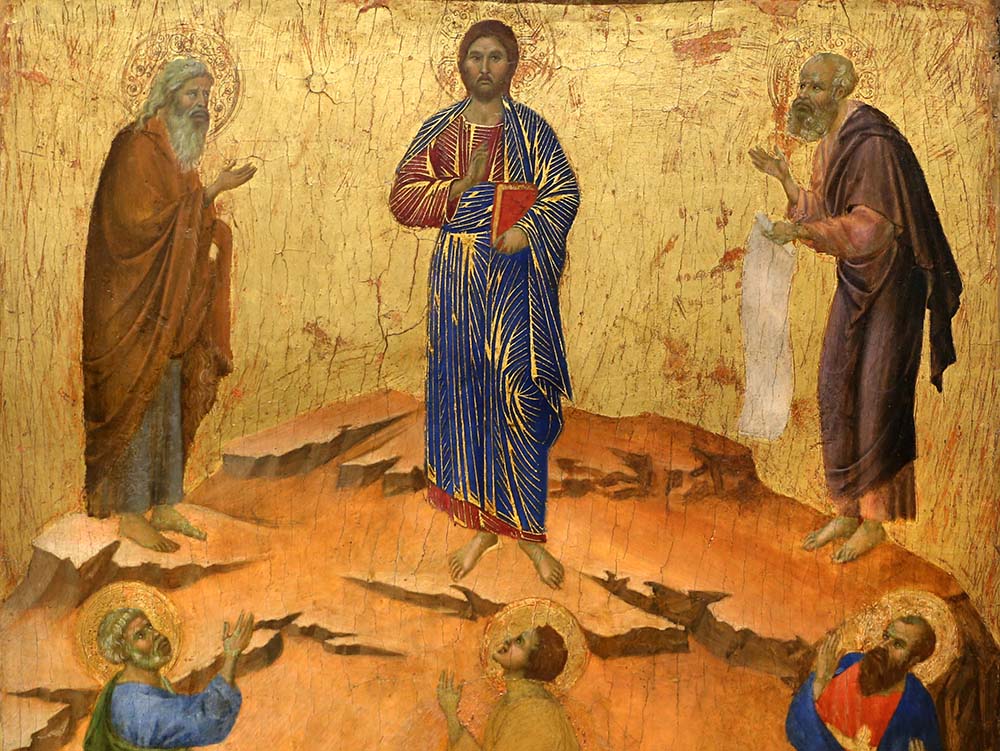
"The Transfiguration" (1311, detail), from the Maestà of Duccio di Buoninsegna (Wikimedia Commons/Sailko)
That means we become our best selves, animators who inspire and encourage others to become part of the message. We rise by lifting others, and no one is left behind.
How we do this? Marianne Williamson articulates the pathway so clearly:
Our deepest fear is not that we are inadequate. Our deepest fear is that we are powerful beyond measure. It is our light, not our darkness, that most frightens us. We ask ourselves, Who am I to be brilliant, gorgeous, talented, fabulous? Actually, who are you not to be? You are a child of God. Your playing small doesn't serve the world. There is nothing enlightened about shrinking so that other people won't feel insecure around you. We are all meant to shine, as children do. We were born to make manifest the glory of God that is within us. It's not just in some of us; it's in everyone. And as we let our own light shine, we unconsciously give other people permission to do the same. As we're liberated from our own fear, our presence automatically liberates others.
Thomas Merton articulates this reality of the God within in these words: "God has, so to speak, put something of the divine goodness in everything. There are holy sparks in all created beings. The human task is to see these things and to liberate the divine sparks in creation by praise, love, and joy."
And so, by developing the self that God intended me to be, the ego is set aside and you, I/we become the great co-creators of the reign of God.
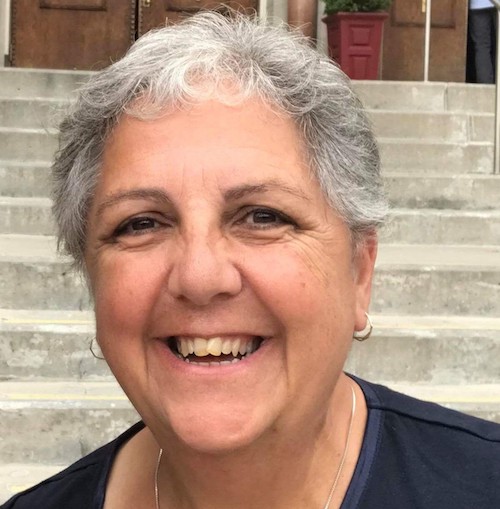 Rita Malavisi is a Sister of St. Joseph of the Sacred Heart from Melbourne, Australia, of Italian and Arabic ancestry. In Melbourne, she studied primary teaching, religious education and spiritual direction, and worked in both elementary and high school education as well as parish ministry. While serving as information technology coordinator for her community, she did adult faith formation as well as pastoral care for asylum seekers. She is currently working on a degree in pastoral studies at the Catholic Theological Union in Chicago (graduating in May 2021), while serving in her congregation's immersion and discernment of call formation group.
Rita Malavisi is a Sister of St. Joseph of the Sacred Heart from Melbourne, Australia, of Italian and Arabic ancestry. In Melbourne, she studied primary teaching, religious education and spiritual direction, and worked in both elementary and high school education as well as parish ministry. While serving as information technology coordinator for her community, she did adult faith formation as well as pastoral care for asylum seekers. She is currently working on a degree in pastoral studies at the Catholic Theological Union in Chicago (graduating in May 2021), while serving in her congregation's immersion and discernment of call formation group.
A salt doll journeyed for thousands of miles over land, until it finally came to the sea.
It was fascinated by this strange moving mass, quite unlike anything it had ever seen before.
"Who are you?" said the salt doll to the sea.
The sea smilingly replied, "Come in and see."
So the doll waded in. The farther it walked into the sea the more it dissolved, until there was only very little of it left. Before that last bit dissolved, the doll exclaimed in wonder, "Now I know what I am!"
Why am I reminded of this story when I read the words of Jesus from Luke 9:23-24? What part of the story of the salt doll resonates with formation programs today? How does this story inform formation programs and processes today that are centered around the formation of the whole person?
Formation programs and processes in religious congregations are developed so that a person can know fully who they are and understand themselves at a deeper level. Yes, they encourage self-development and self-confidence, but they offer so much more.
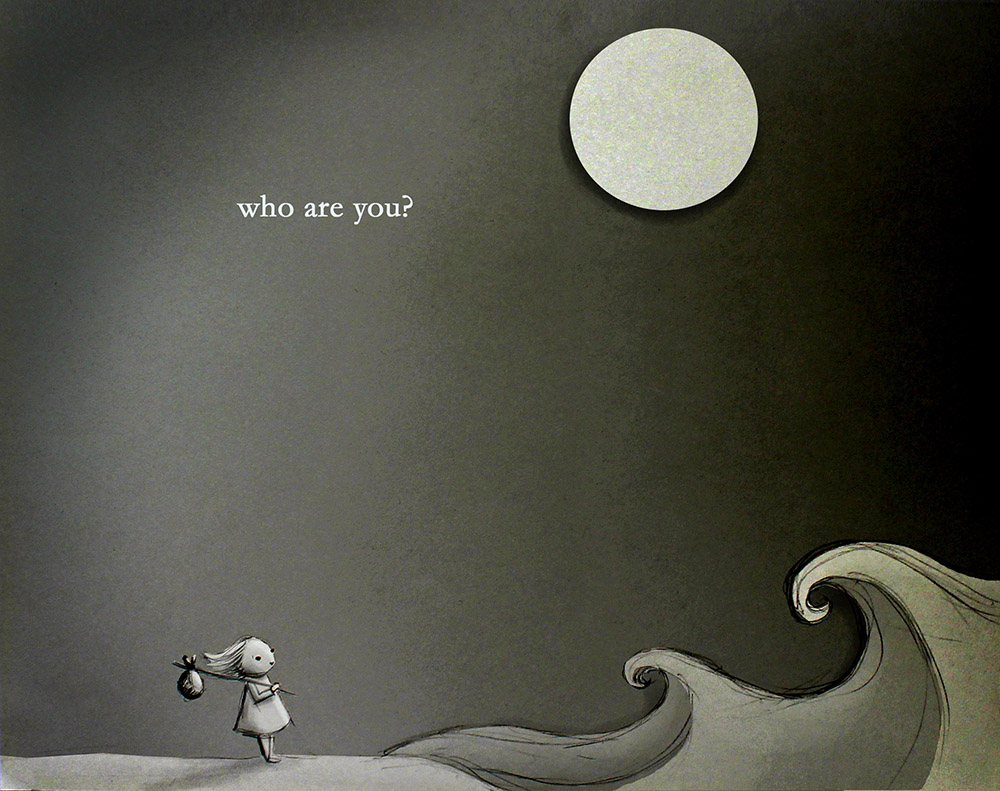
"The Salt Doll" by artist Maia Walczak (©Maia Walczak. All rights reserved. Used with permission.)
The story of the salt doll was shared during my novitiate years more than 30 years ago. Many, many parables and stories were used for us to reflect upon the nature of religious life, and somehow, this story stands out. It echoes the words of Jesus in Luke: that if anyone wants to follow Jesus, they must lose themselves completely.
I am reminded of the radical prayer of St. Ignatius of Loyola, which I used as part of my life vow ceremony: "Take Lord, and receive all my liberty, my memory, my understanding, and my entire will, all that I have and possess." The journey of formation is a journey of transformation. A journey deeper into relationship with God through Jesus. We don't do it for ourselves. We do the journey of personal transformation for the sake of the mission.
Joan Chittister in her book The Fire in These Ashes also acknowledges the completeness of the journey of personal transformation. She says:
To live a religious life takes all the life we have. To live a religious life takes the heart of a hermit, the soul of a mountain climber, the eyes of a lover, the hands of a healer, and the mind of a rabbi. It requires total immersion in the life of Christ and complete concentration on the meaning of the Gospel life today.
Jesus asks nothing less than to give our whole selves, to deny ourselves, to take up our daily crosses. We need look no further than the lives of the saints or the examples of the founders of our congregations to see such servants of love and mercy.
For myself, I look at the life of Mary MacKillop, Australia's first saint and co-foundress of my congregation, who certainly had more than her fair share of crosses in her life and who embraced them with the knowledge that she would be held securely in God.
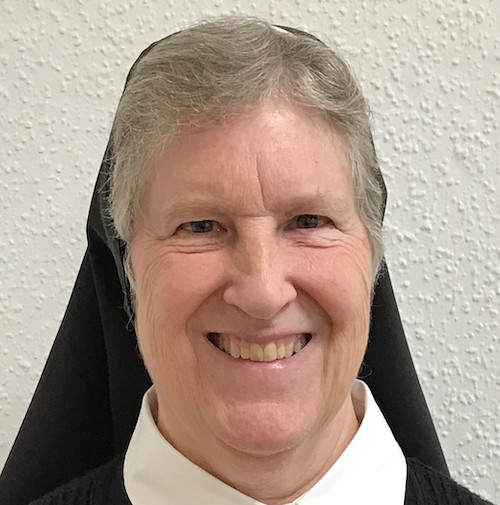 Mary Joseph Schultz of New Jersey is a member of the Sisters of Christian Charity. For many years, she taught theology in high schools before becoming president of Assumption College for Sisters in Mendham, New Jersey. During the Vatican apostolic visitation in 2010, she was chosen as one of the apostolic visitators of U.S. women religious. She went on to serve as campus minister for two colleges in New Jersey, as a member of her provincial leadership team, and later worked as parish pastoral associate. She is currently serving as first councilor and vicaress at the Sisters of Christian Charity generalate in Germany.
Mary Joseph Schultz of New Jersey is a member of the Sisters of Christian Charity. For many years, she taught theology in high schools before becoming president of Assumption College for Sisters in Mendham, New Jersey. During the Vatican apostolic visitation in 2010, she was chosen as one of the apostolic visitators of U.S. women religious. She went on to serve as campus minister for two colleges in New Jersey, as a member of her provincial leadership team, and later worked as parish pastoral associate. She is currently serving as first councilor and vicaress at the Sisters of Christian Charity generalate in Germany.
Formation programs in religious life, as the life itself, have been in flux for the past 50 years. Because of drastic upheavals in society and family, in culture and morality, the very framework of formation has undergone a seismic shift. There can be no going back. The focus today, as always, must be on "losing our lives" for the sake of union with God within the charism of the institute.
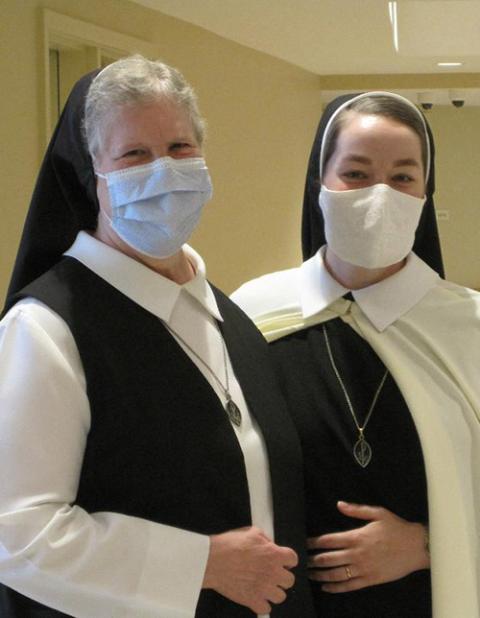
Christian Charity Sr. Mary Amata Reifsnyder on her Final Vow Day, Aug. 15, 2020. (Provided photo)
Today's young women who enter religious life come into a far different atmosphere than those of us who entered 50 or more years ago. Many of today's entrants have degrees, have held jobs for years, had their own cars and apartments yet found there was still a gnawing hunger for more. They have explored various life choices and bravely discerned the next step on the pathway, perhaps with the help of a spiritual director. I believe that stepping over the threshold, they come into the congregation with a good deal of self-confidence and sense of their own giftedness. Now, they take up the challenge of "losing it" in preparation for a mature gift of self through the vows.
For those of us who entered at a younger age, at the time of the Second Vatican Council or before, things were quite different. We were adolescents who knew we were called to religious life but knew little of what that really meant. Speaking for myself, when I entered the aspirancy at 14, I was a child with a very limited knowledge of self or giftedness. All I knew was that God was calling me to be a Sister of Christian Charity. Of that, I was sure. And I would do what it took to answer the call.
Knowledge and acceptance of self, whether it comes sooner or later, is basic to formation. St. Catherine of Siena advises us to "enter into the cell of self-knowledge." We must be gently assisted to uncover the gifts and flaws of our personalities in all honesty, with simplicity and great trust.
We learn to see ourselves through the eyes of God and others, with tenderness and love. We grow to embrace the shortcomings and learn the abandonment that will take a lifetime. The more we accept and transform into the God-vision of ourselves, the more we can freely turn ourselves over to the one who created us and called us for mission.
At the time of perpetual vows, with eyes open and hearts on fire, we offer to God the total gift of ourselves that God first presented to us.
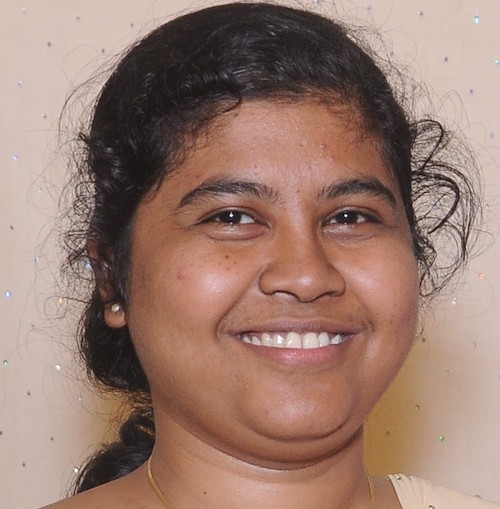 Robancy A. Helen is from Tamil Nadu, South India, and is a member of the Idente Missionaries (Religious Institute of Christ the Redeemer). With an academic background in English, social work and theology, she has written about and worked in women's issues. Recently, she served for five years as the program coordinator in the Catholic Bishops' Conference of India's Office for Scheduled Castes/Backward Classes. She is currently working on doctoral studies and training Catholic youth in leadership and social issues.
Robancy A. Helen is from Tamil Nadu, South India, and is a member of the Idente Missionaries (Religious Institute of Christ the Redeemer). With an academic background in English, social work and theology, she has written about and worked in women's issues. Recently, she served for five years as the program coordinator in the Catholic Bishops' Conference of India's Office for Scheduled Castes/Backward Classes. She is currently working on doctoral studies and training Catholic youth in leadership and social issues.
We humans search for truth. It makes us realize who we are, what we are called for, and gives us a sense of commitment. We find God and his voice, and they become familiar. Is God's call only once in a lifetime?
At first, I thought I would receive only one call from God. It took me years to realize the true meaning of my calling when I denied myself, my passion and comfort, and adapted to his mission — to be with the poor.
God calls us every day through different people and life situations, when we love our God and know his love for us and our neighbor. He entrusts us with a mission to love. To focus on God's love is to ascend the mountain of love and offer our lives day by day in the service of others.
His call is super challenging! It requires courage and perseverance even when we are weak and sad. When taking up our cross becomes difficult, we are called to offer it to Christ with free will. We do not need to understand what is happening with our lives, but surrender to him in faith.
This self-emptying attitude makes us trust him. Our lives become so safe when we take up the cross and follow him. This path may not be easy, but there is always an assurance of happiness and peace in our hearts.
Advertisement
When we are faithful, he shows us the way; he shows us the road we need to take. Choosing that road may be difficult. But each time we choose to stand beside the cross of Jesus, we say yes to him. This yes may mean leaving behind our comfort zone of being with our loved ones, of having a good job, or living in a home where everybody understands us.
He gives us everything, but then he chooses us to be with people who are poor, marginalized and vulnerable. Leaving behind our comfort zone makes us worried. Taking up a new mission assigned by God gives us the opportunity to take up the cross and follow him. Though filled with challenges and pain, our cross will be our path to heaven.
Carrying Jesus' cross will never leave us empty-handed, especially if we are choosing his love to serve the oppressed, the neglected and the needy. He assures our hope, faith and love in all the difficult moments of life.
Our commitment to God is taking up our cross every day, choosing to serve God and his people. Jesus came to serve, and this led him to the cross. Our service should lead us to Jesus.
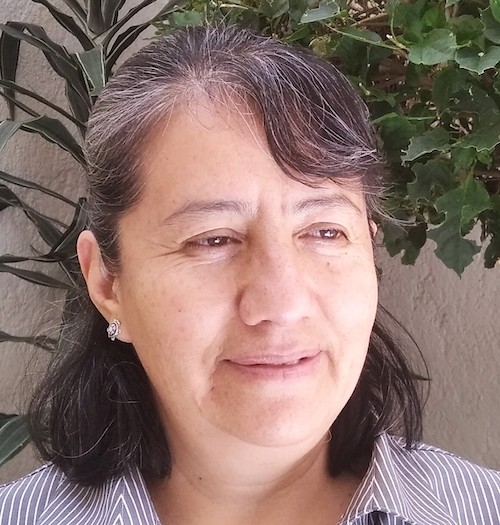 Blanca Alicia Sanchez is a sister of the Verbum Dei Missionary Fraternity in Mexico City. She received early formation and education in Guadalajara, Mexico, a licentiate in Rome, and other courses in the Philippines, Portugal, Mexico and London. A teacher of dogmatic theology and a spiritual director, she has worked in vocations, retreats and novitiate formation. She was a formator in the International Center of Missionary Formation in Spain and in novitiates on the Isle of Wight, United Kingdom, and in Cebu, Philippines.
Blanca Alicia Sanchez is a sister of the Verbum Dei Missionary Fraternity in Mexico City. She received early formation and education in Guadalajara, Mexico, a licentiate in Rome, and other courses in the Philippines, Portugal, Mexico and London. A teacher of dogmatic theology and a spiritual director, she has worked in vocations, retreats and novitiate formation. She was a formator in the International Center of Missionary Formation in Spain and in novitiates on the Isle of Wight, United Kingdom, and in Cebu, Philippines.
When Pearl, Priscilla, Teresa and Issy arrived at our Verbum Dei Formation House, they asked to be sent as soon as possible "to do mission."
As they developed a closer relationship with Jesus through prayer, each one of them experienced his total and unconditional love and acceptance. From this relationship, a newfound confidence and deeper security in their identity as daughters of God developed. It was an experience of such love and freedom that their idea of the mission completely changed. Mission was no longer simply doing things for others or a job.
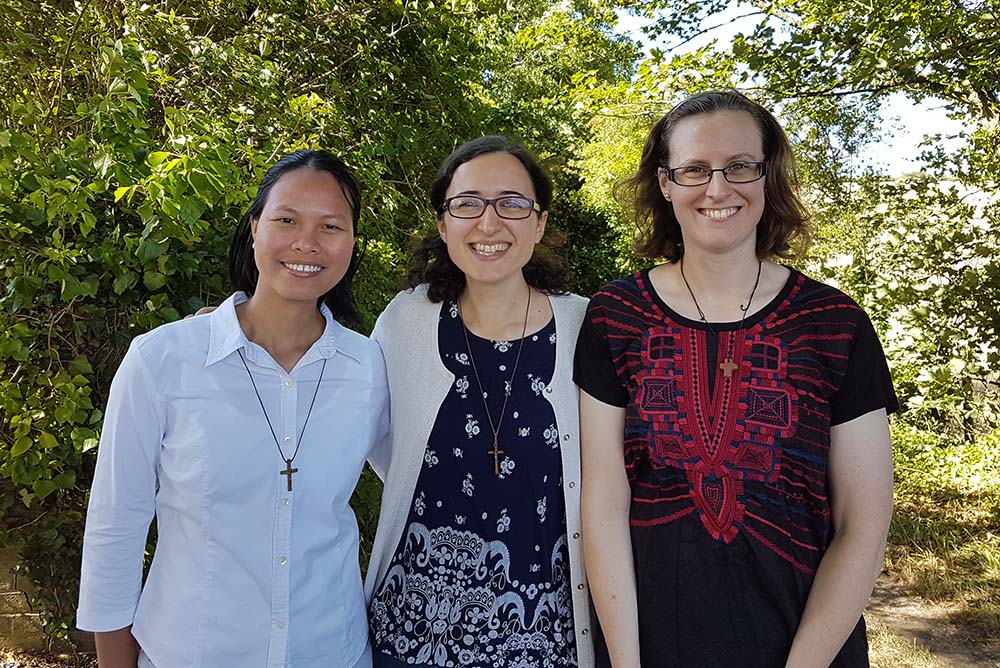
From left: Pearl, Teresa and Issy, Verbum Dei Missionaries in formation* (Catherine Cruz)
Mission is matter of love, of giving one's self out of love for Jesus and for his people. Jesus tells us: "If any one wishes to come after me" (Luke 9:23). He is saying, "If you want to follow me, first, be my friend. You are not my servant. I don't call you to fulfill a duty."
Prayer is essential to formation in Verbum Dei. In prayer, these young missionaries integrated the human and psychological formation that they were receiving.
Along the journey, they understood that "let him deny himself" means to cleanse our hearts of selfishness, egoism and individualism. This is to deny myself, to let go of what is not really me. We are not our money or possessions. This is not who we are! We are children of God, called to be expressions of his selfless, universal and sacrificial love for all people without exception or distinction.
To take up our own cross becomes real when we deal with our wounds and brokenness. By accepting both our shadow and our light, we become compassionate toward others who are broken. Jesus' words, "take up his cross daily and follow me," are concrete. Only by loving our own limitations can we show others it's possible to follow Jesus with our pains, limitations and joys.
Through their theological formation, the "girls" became aware of the need to live the beatitudes in a society where efficiency and productiveness matter more than the person herself. When Jesus says, "For whoever wishes to save his life shall lose it, but whoever loses his life for my sake, he is the one who will save it," he has something practical in mind. To give our time and to go out of ourselves is to lose our life.
Issy, Teresa, Priscilla and Pearl have grown in self-confidence. They feel valued for who they are!

